113 Self-Care Ideas That Transform Your Life
It might take trial-and-error to figure out what kinds of activities improve your mood. We made it easy for you by making a list of 113 different self-care ideas that you can turn into healthy habits to transform your life.

Think about everything you do in a day. If I had to guess, most of your days look similar.
Doing the same things over and over can get boring or stressful. It’s even worse if we keep the same pattern if some of these activities aren’t healthy for us.
Every so often you might treat yourself to a day off of your routine. To make things easier, though, try to incorporate new healthy activities into each of your days. Doing self-care activities can lead to better habits for your well-being.
You won’t feel as bogged down always doing the same things if they’re good for you. Getting into a routine of self-care activities will help you stress less and better care for mental and physical health.
So where do you even start? It might take trial-and-error to figure out what kinds of activities improve your mood. We made it easy for you by making a list of 113 different self-care ideas that you can turn into healthy habits to transform your life. Some of these fit within multiple categories, so we picked the closest one to each.
Get Moving
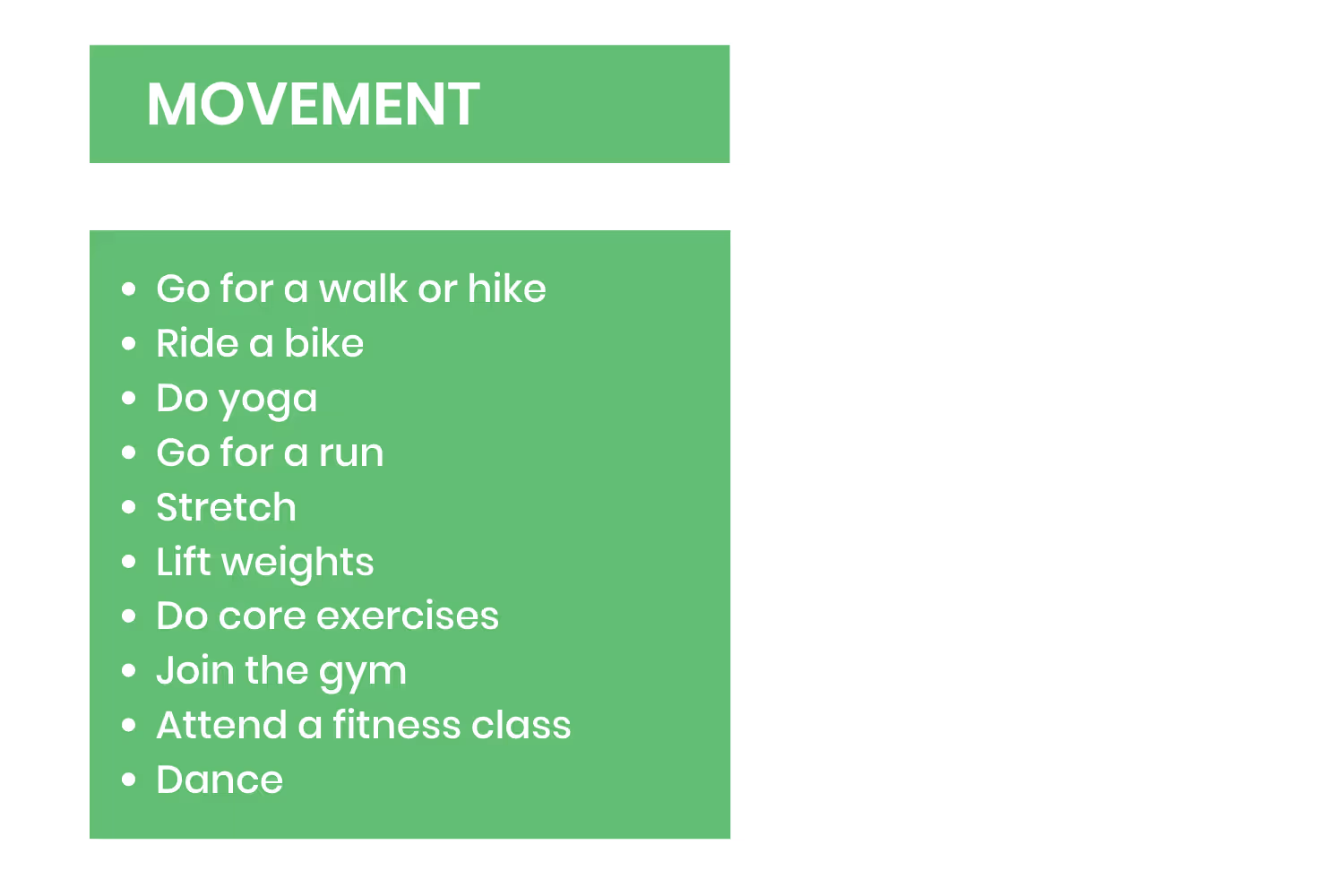
Exercise has so many health benefits. Other than it helping our physical health, it also helps our mental wellbeing.
When you think about exercising, you might just consider it for weight-loss reasons. But it’s so much more important than just maintaining a healthy weight. It also wards off diseases and conditions. Regular exercise can prevent and manage problems such as stroke, type 2 diabetes, certain cancers, and heart disease according to the Mayo Clinic.
It’s also good for our brain as it improves cognitive function and mood. Exercise reduces stress, anxiety, and depression because it stimulates mood-boosting brain chemicals. It can also help self-confidence about appearance.
Because of these effects on physical and mental health, it gives you more energy and regulates sleep. This will help you have more motivation doing other activities that are on your to-do list and can improve self-care.
For some of you, the thought of exercising might sound more demotivating than exciting. Maybe you’ve tried it before and you felt miserable. Well, there are so many different kinds of movement that you can try to find one that works for you. It can be as simple as going for a walk or as intense as attending a fitness class.
- Go for a walk or hike (without using your phone)
- Ride a bike
- Do yoga
- Go for a run
- Stretch
- Lift weights
- Do core exercises
- Join the gym
- Attend a fitness class
- Dance
Technology Isn't Helping
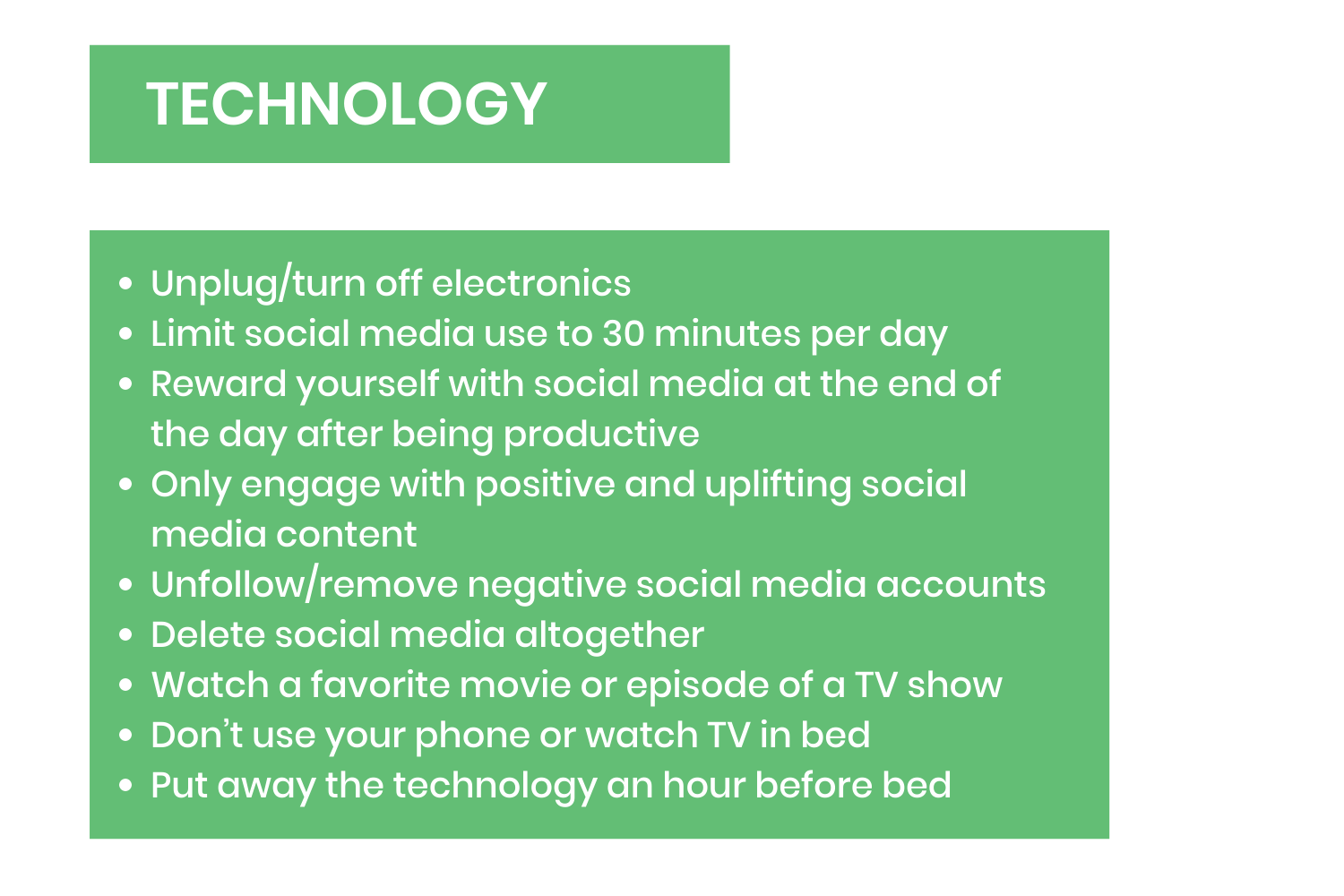
It’s so easy to get lost on our phones checking notifications and scrolling through social media. We constantly pick up our phones and it might seem like we’re only on it for a few seconds at a time.
But this adds up. People spend an average of 153 minutes on social media per day. Assuming people start using the platforms when they’re ten, the current trend would mean people spend six years and eight months on social media.
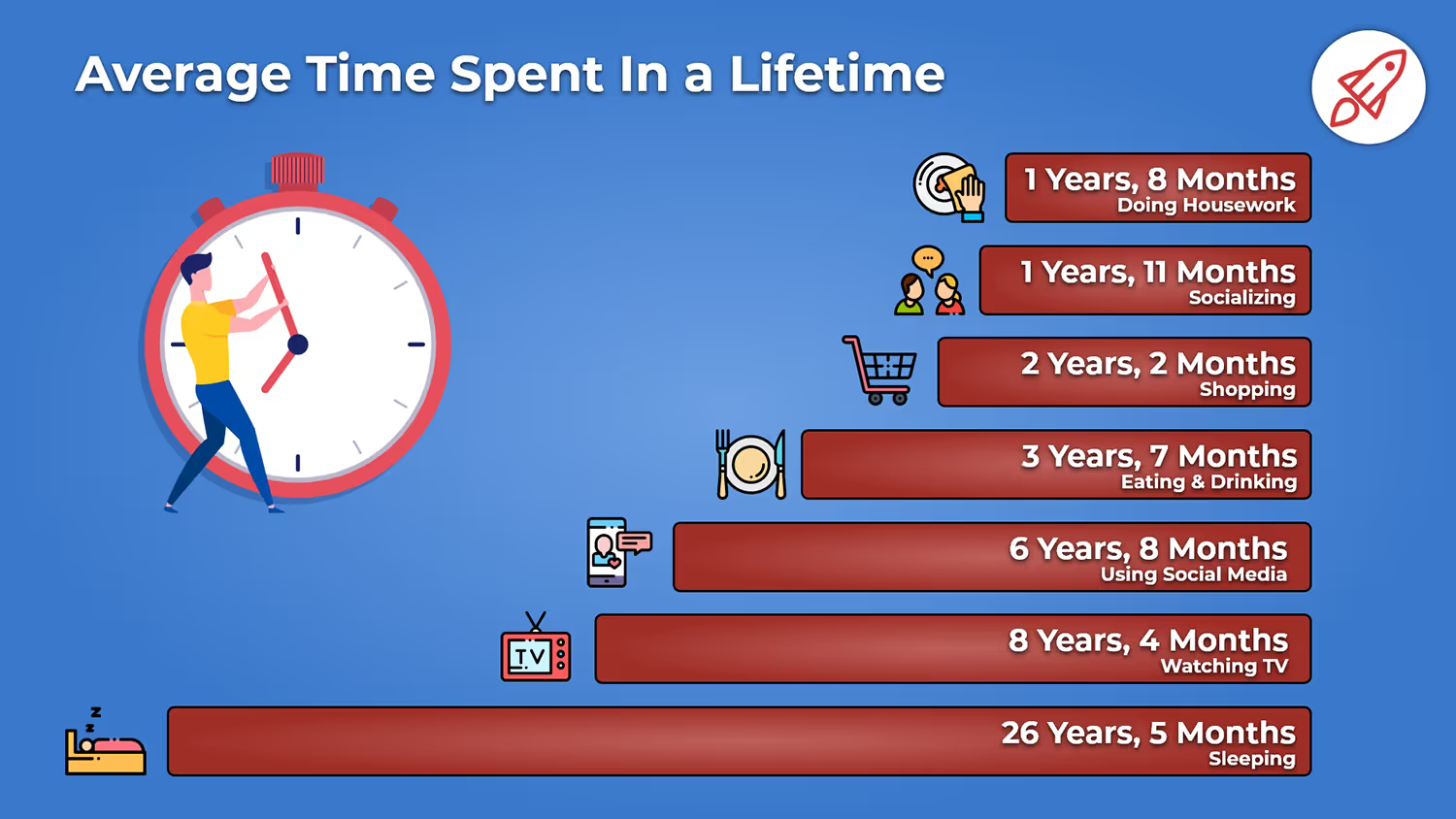
And this is only for social media use. Now think about how much time you use technology to watch movies, do work, online shop, play video games, and anything else on some sort of device.
It’s easy to spend most of our day staring at a screen. Doing each of these things isn’t necessarily bad, but too much of it isn’t healthy. It can be addicting and wastes time that we could be spending on productive activities. Technology also interrupts time spent with others.
I’m not saying you should never use a technology device. This is almost impossible with how society is today. But limiting the time you spend on a device can help make you more productive and improve your mental health.
Social media is addictive because it stimulates dopamine. Thus, it can be hard to focus on tasks and find pleasure in our other activities. Taking a break helps us focus on productivity and removes online negativity from our daily life.
Rewarding yourself helps you do meaningful and necessary tasks while still getting to use technology later.
- Unplug/turn off electronics
- Limit social media use to 30 minutes per day
- Reward yourself with social media at the end of the day after being productive
- Only engage with positive and uplifting social media content
- Unfollow/remove negative social media accounts
- Delete social media altogether
- Watch a favorite movie or episode of a TV show
- Don’t use your phone or watch TV in bed
- Put away the technology an hour before bed
Bring Out Your Inner Artist
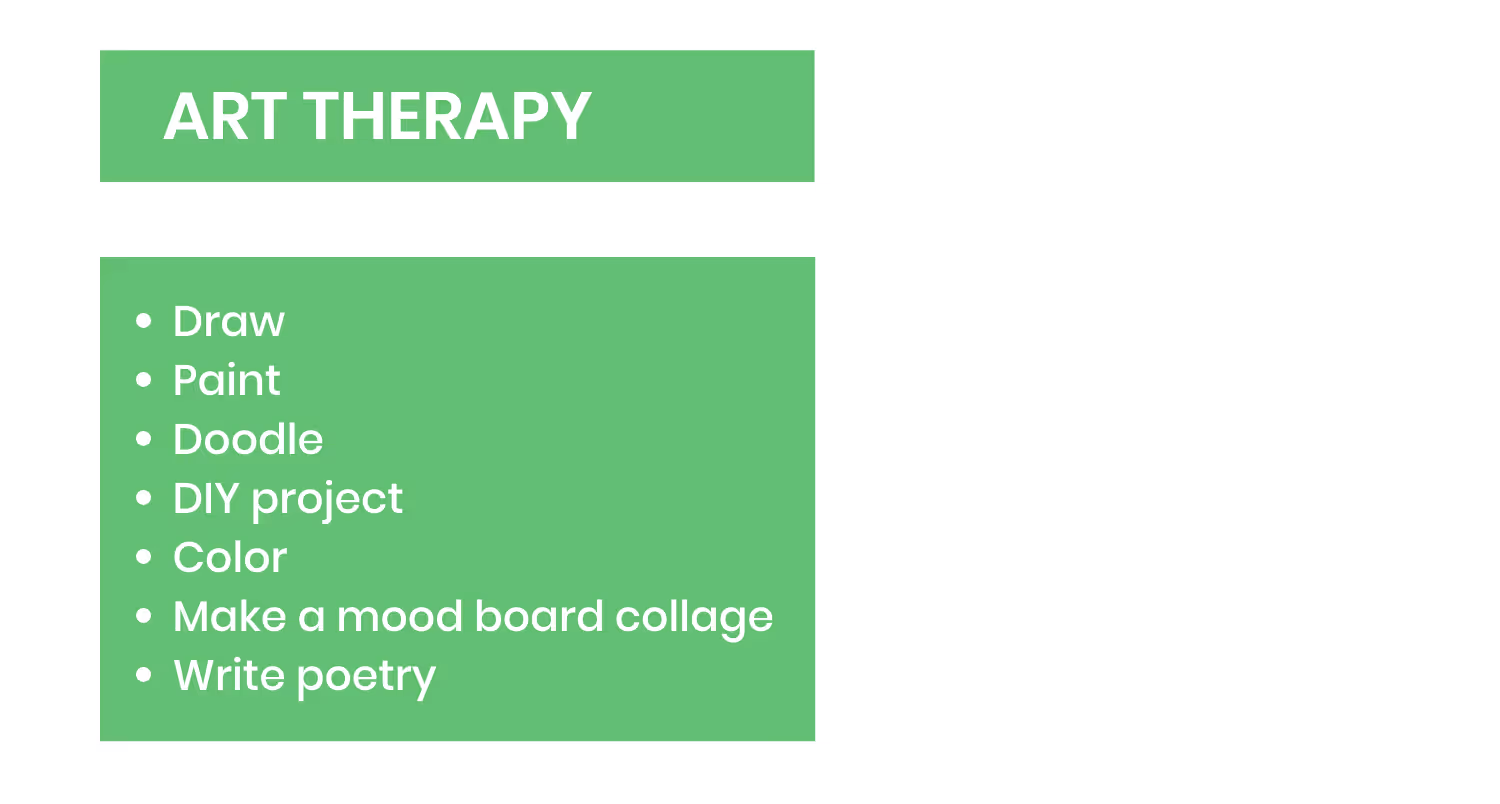
I imagine after you read the headline for this section your first reaction was, “I’m not good at art.”
The point of art therapy isn’t if you’re good at it. It’s about the process - not the product - because it’s about self-expression. Although, experimenting with different techniques can help you find something you’re good at.
Making art gives you a feeling of accomplishment, especially if you do find that you’re artistically talented. It’s an emotional release to express your feelings, and it relieves stress and relaxes the mind and body. One study found that just 45 minutes of art significantly reduces levels of the stress hormone cortisol.
- Draw
- Paint
- Doodle
- DIY project
- Color
- Make a mood board collage
- Write poetry
Five Letters: Relax
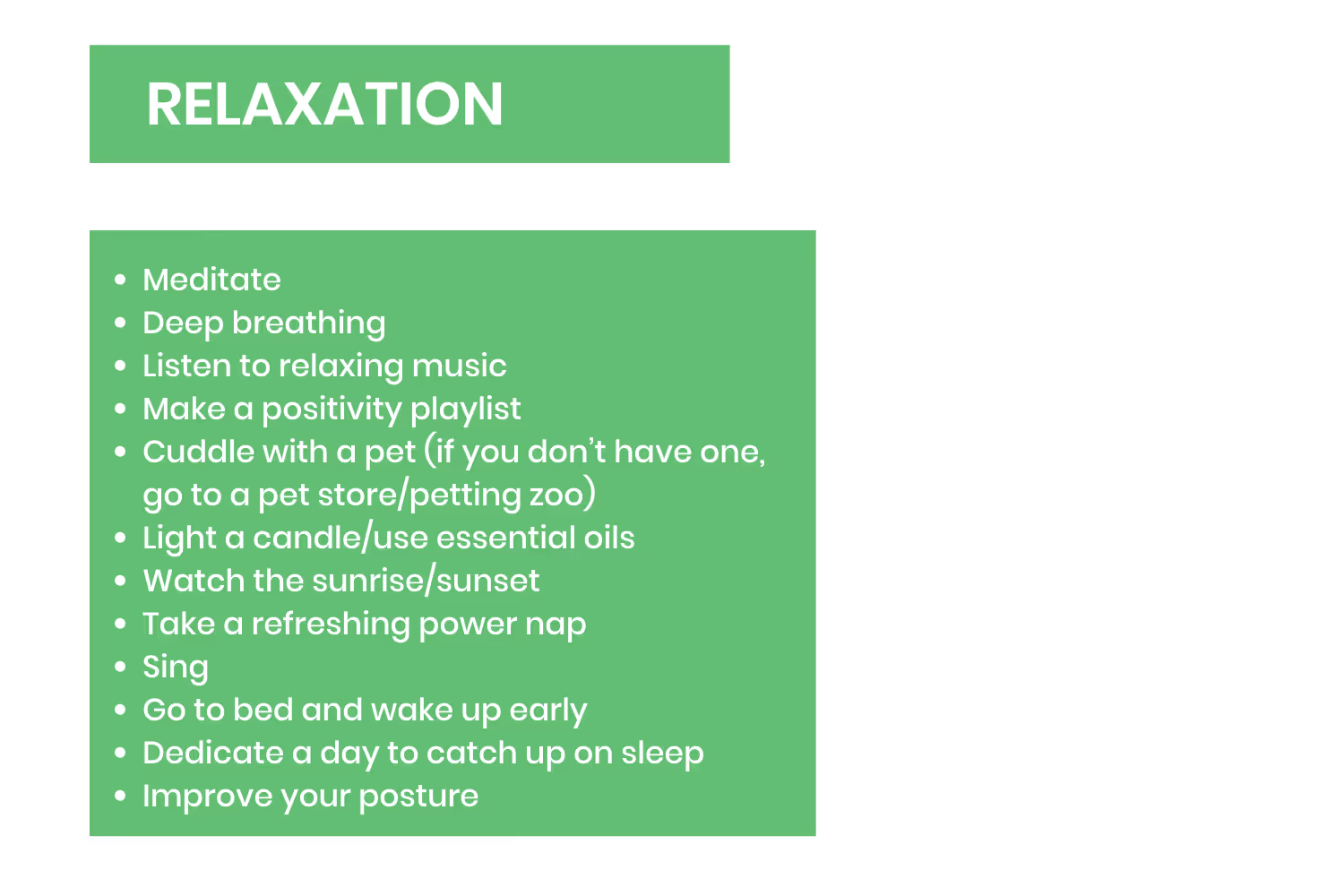
Finding relaxing activities has so many benefits, including:
- Lowering heart rate and blood pressure
- Maintaining normal blood sugar levels
- Improving digestion
- Relaxing muscles
- Improving concentration and mood
- Improving sleep and lowering fatigue
Relaxation techniques help you cope with, manage, and decrease stress. The ability to relax will take practice. The more you do these activities, the easier it will be to relax. It also helps you notice physical sensations of stress. This way, you can identify stressors as you notice the physical symptoms and then prevent these stressors from getting worse.
- Meditate
- Deep breathing
- Listen to relaxing music
- Make a positivity playlist
- Cuddle with a pet (if you don’t have one, go to a pet store/petting zoo)
- Light a candle/use essential oils
- Watch the sunrise/sunset
- Take a refreshing power nap
- Sing
- Go to bed and wake up early
- Dedicate a day to catch up on sleep
- Improve your posture
Eat The Right Stuff
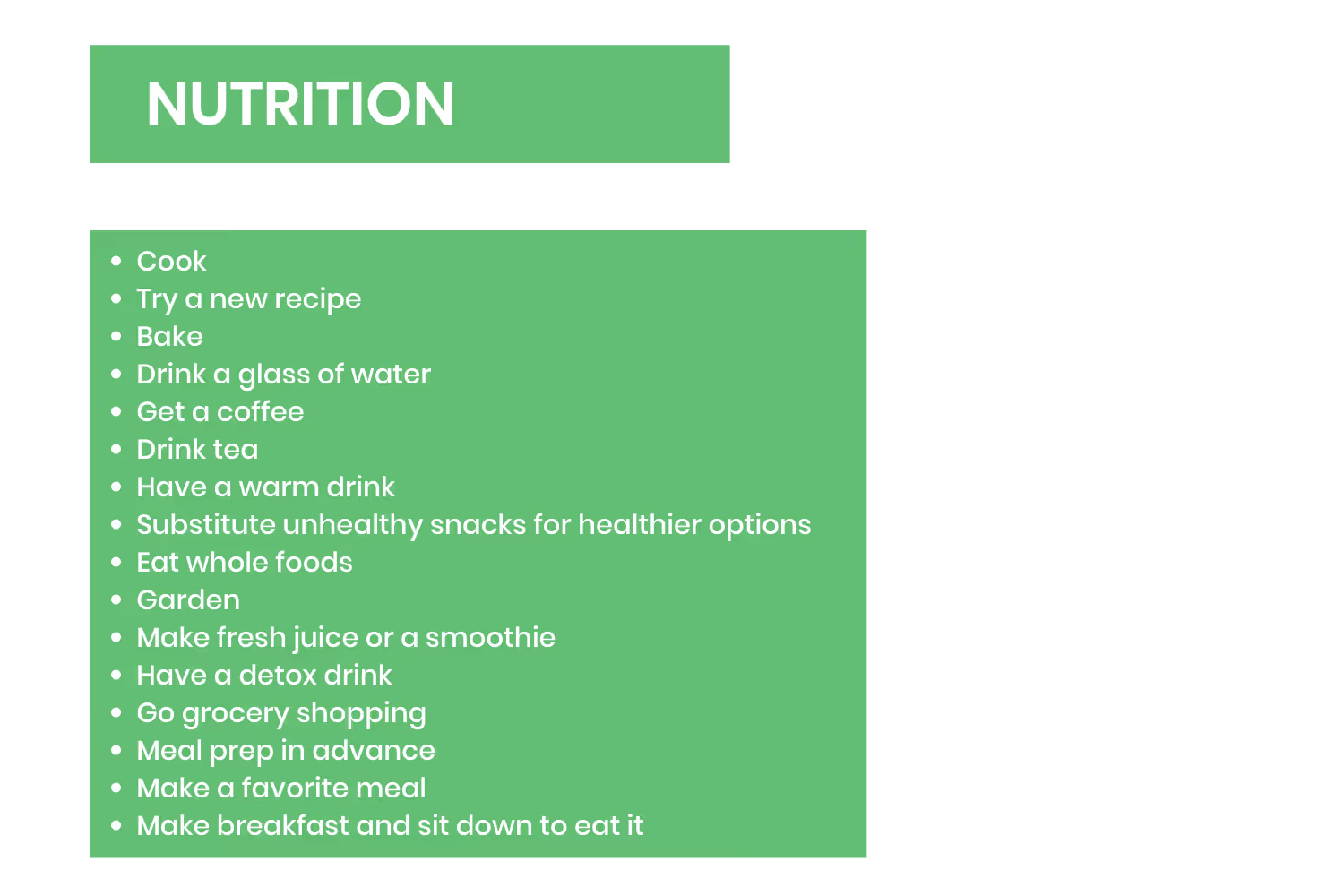
What we eat impacts all aspects of our health. While you don’t need to constantly diet or restrict certain foods, it’s important to be mindful of what you put in your body.
Trying some of these tips will make you more conscious of how you nourish yourself. They also help you prioritize better eating to take care of your body.
- Cook
- Try a new recipe
- Bake
- Drink a glass of water
- Get a coffee
- Drink tea
- Have a warm drink
- Substitute unhealthy snacks for healthier options
- Eat whole foods
- Garden
- Make fresh juice or a smoothie
- Have a detox drink
- Go grocery shopping
- Meal prep in advance
- Make a favorite meal
- Make breakfast and sit down to eat it
Socialize with People
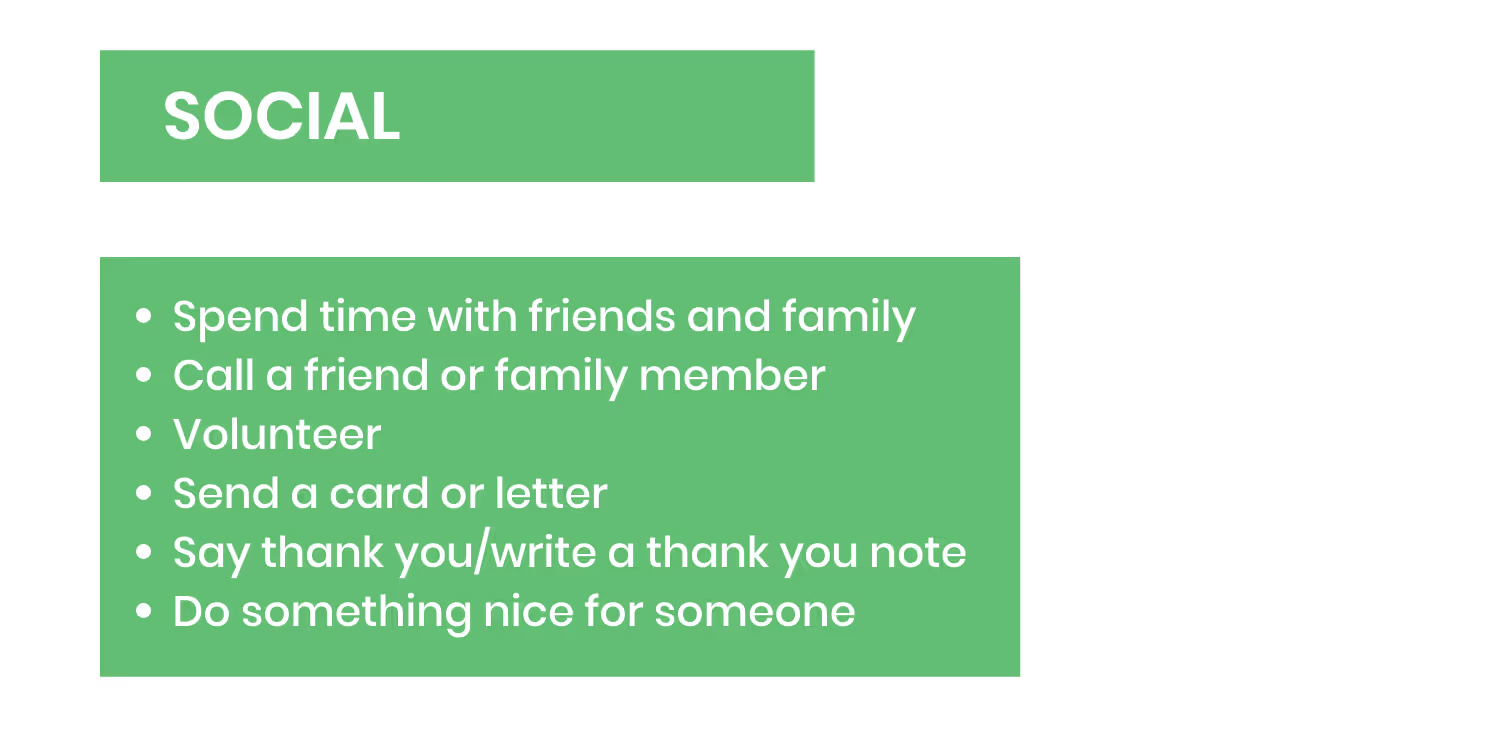
Humans are social beings. Face-to-face contact triggers the release of chemicals that regulate our response to stress and anxiety. Maintaining close friendships as we get older helps prevent mental decline. These friendships also lower the rate of future depression and anxiety.
Not only does being social support our emotional wellbeing, but it has a connection to physical health benefits. Social people tend to have better habits and healthy lifestyles. Researchers have even found that those who aren’t social have a 60% higher risk for prediabetes, which generally leads to diabetes.
- Spend time with friends and family
- Call a friend or family member
- Volunteer
- Send a card or letter
- Say thank you/write a thank you note
- Do something nice for someone
Keep Your Brain Stimulated
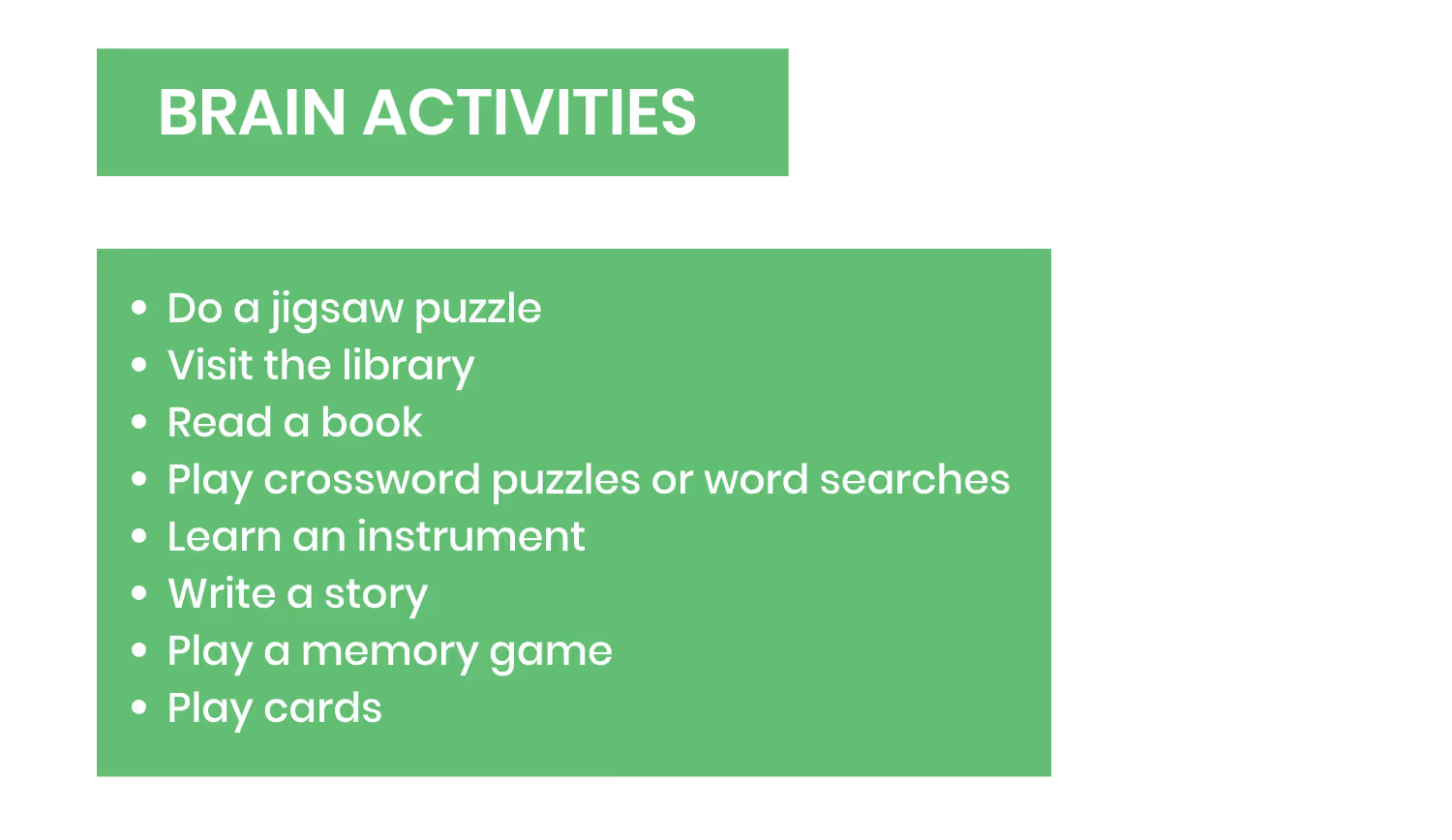
The long-term benefits of mentally stimulating activities are still in question. Some studies show that they can help prevent or delay dementia, but other researchers say that there’s no connection.
Regardless, these brain activities can still improve thinking skills which diminish with age. These include processing speed, planning abilities, reaction time, decision making, and short-term memory.
- Do a jigsaw puzzle
- Visit the library
- Read a book
- Play crossword puzzles or word searches
- Learn an instrument
- Write a story
- Play a memory game
- Play cards
Treat Yo-self
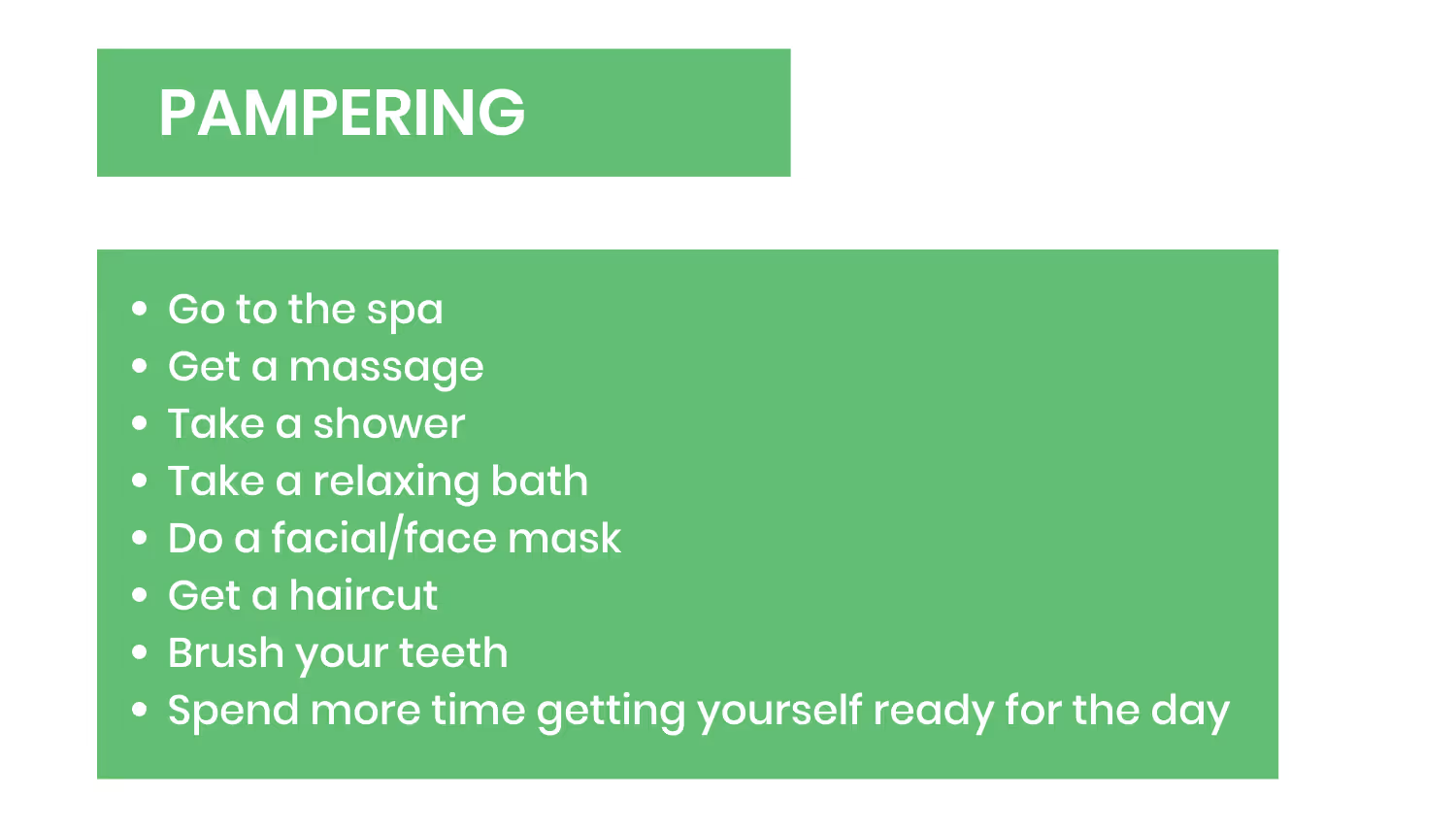
These activities can help with relaxation which I mentioned earlier.
But these also impact hygiene. Having good hygiene can reduce acne, dry skin, poor dental health, and diseases caused by accumulated bacteria.
Besides helping us relax and improving physical hygiene, these types of activities motivate us through the day. If we spend time getting ourselves ready, we’ll feel like our day has more purpose and we’ll have the motivation to be productive. Pampering gives us the energy that reduces stress and tiredness while also boosting self-esteem.
- Go to the spa
- Get a massage
- Take a shower
- Take a relaxing bath
- Do a facial/face mask
- Get a haircut
- Brush your teeth
- Spend more time getting yourself ready for the day
Keep Up On Your Chores
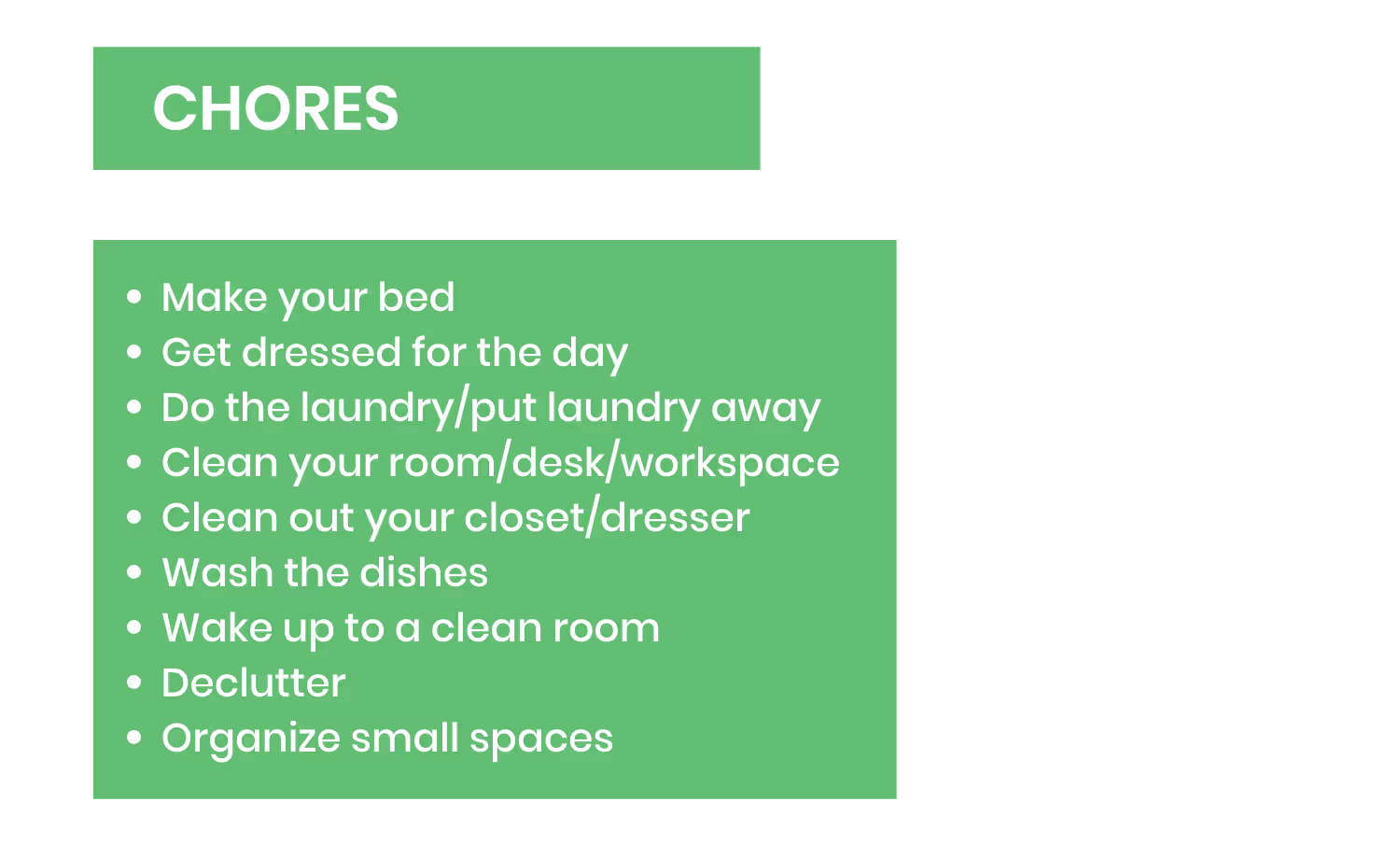
Do you ever feel overwhelmed to do anything because of how many chores you need to finish? Or maybe you’re so overwhelmed by how much there is to do that you can’t find the motivation to start.
The University of California found that those who said their house was messy had increased levels of cortisol. Decluttering and keeping up with household chores are healthy habits to reduce this stress hormone.
- Make your bed
- Get dressed for the day
- Do the laundry/put laundry away
- Clean your room/desk/workspace
- Clean out your closet/dresser
- Wash the dishes
- Wake up to a clean room
- Declutter
- Organize small spaces
Stay Motivated
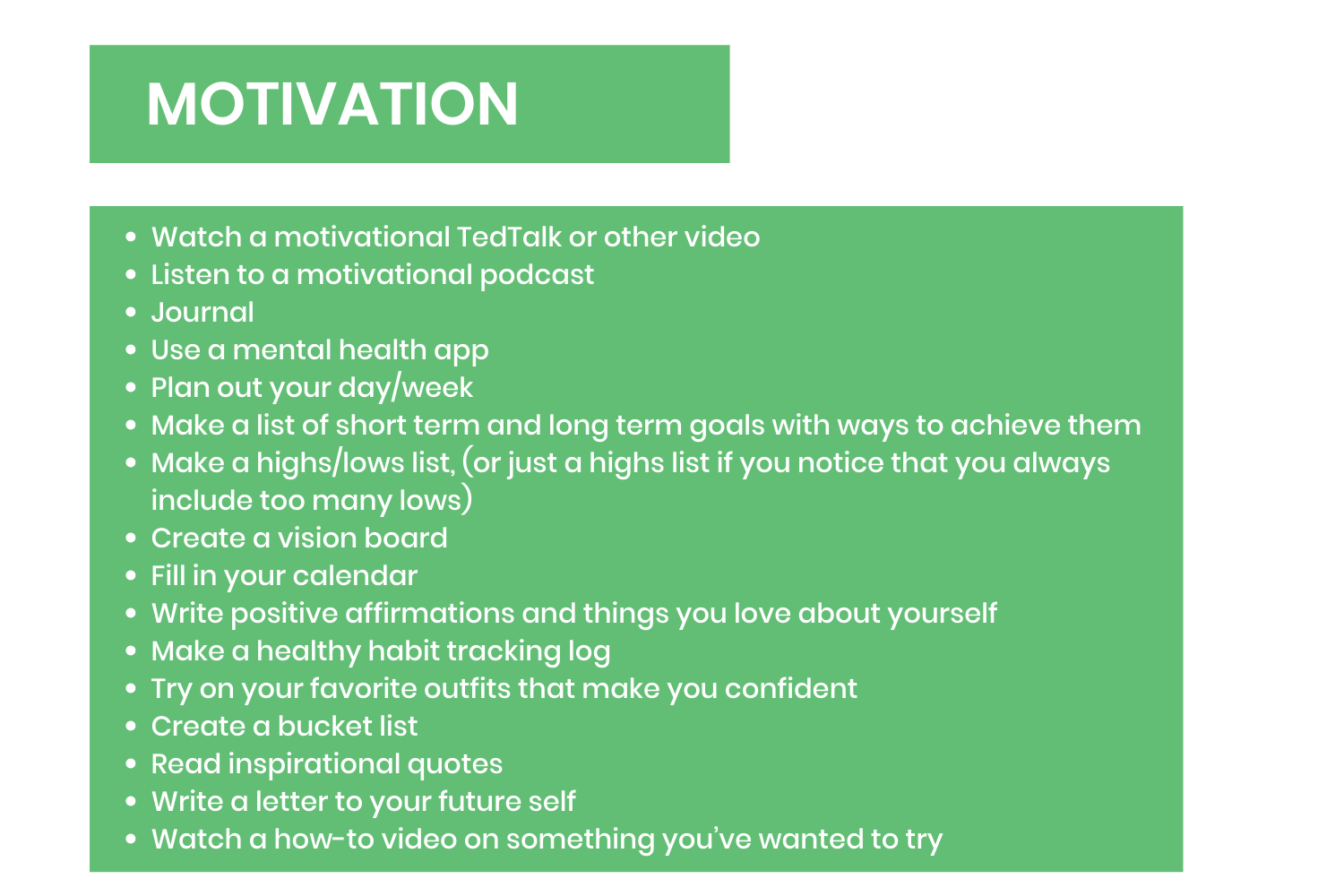
Motivation is necessary for allowing us to adapt, be productive, and maintain wellbeing. It’s especially important during change. This is what drives us to have a sense of purpose and experience personal growth.
Everyone gets their purpose and growth from different activities. But they first need to feel motivated to do those things. Here are some ideas that will help motivate you to do the activities that give you purpose.
Watch a motivational TedTalk or another video
- Listen to a motivational podcast
- Journal
- Use a mental health app
- Plan out your day/week
- Make a list of short term and long term goals with ways to achieve them
- Make a highs/lows list, or just a highs list if you notice that you always include too many lows
- Create a vision board
- Fill in your calendar
- Write positive affirmations and things you love about yourself
- Make a healthy habit tracking log
- Try on your favorite outfits that make you confident
- Create a bucket list
- Read inspirational quotes
- Write a letter to your future self
- Watch a how-to video on something you’ve wanted to try
Switch Things Up
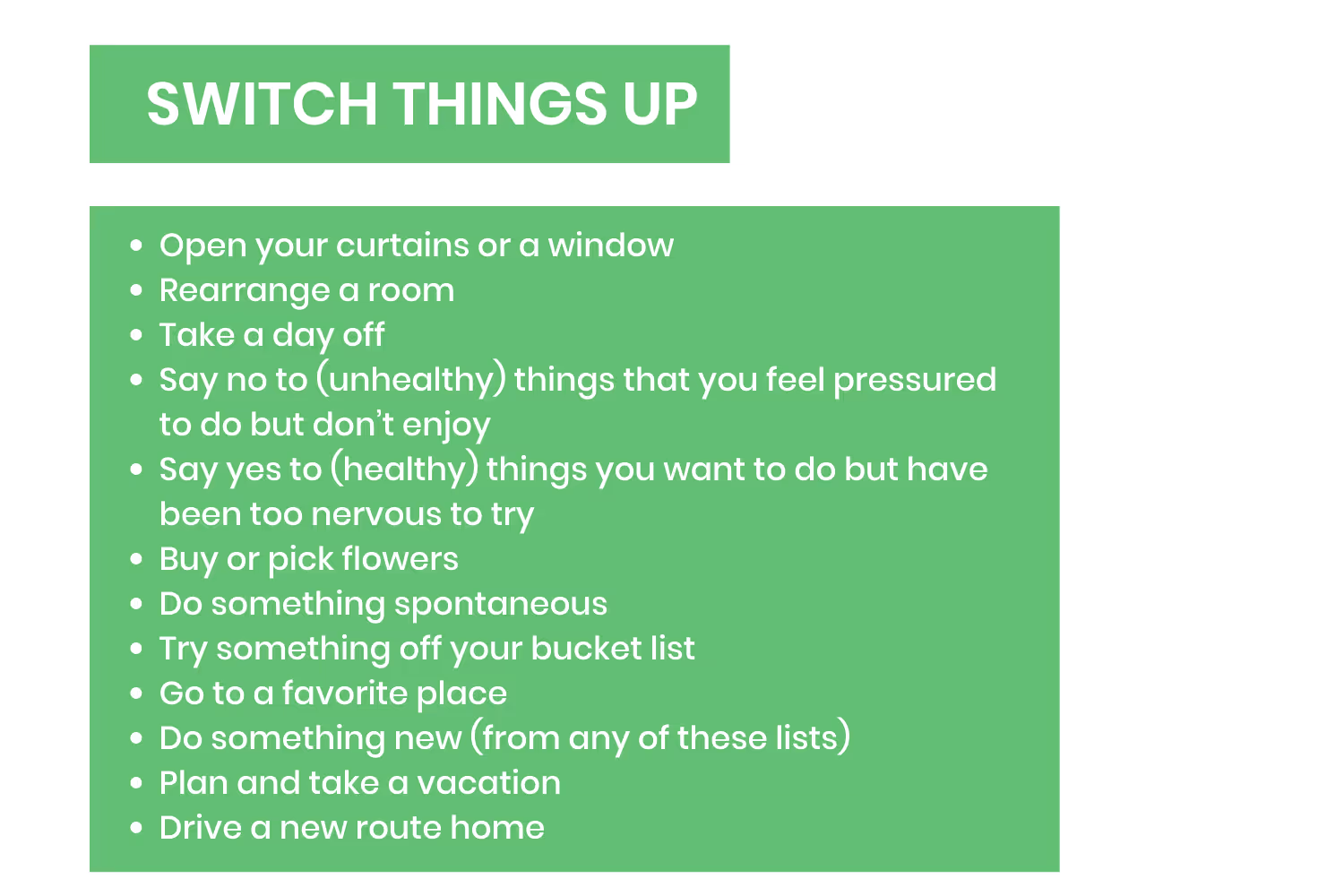
Routines and schedules are beneficial since they keep us on track. They can also prevent stress since we know what to expect for our day. But like I already mentioned, always doing the same thing can get boring and we start to lose motivation.
Switching things up allows people to learn new skills, gain new perspectives, try new things, and break out of the monotony of routine. Doing new activities makes people more open to change and different possibilities. It also stimulates people both emotionally and physically.
- Open your curtains or a window
- Rearrange a room
- Take a day off
- Say no to (unhealthy) things that you feel pressured to do but don’t enjoy
- Say yes to (healthy) things you want to do but have been too nervous to try
- Buy or pick flowers
- Do something spontaneous
- Try something off your bucket list
- Go to a favorite place
- Do something new (from any of these lists)
- Plan and take a vacation
- Drive a new route home
Conclusion
If you’re finding it hard to motivate yourself to be productive or struggle to enjoy your daily routine, you may need to try new self-care ideas.
Doing activities that promote physical and mental wellbeing is necessary. When our days consist of habits that don’t promote this, we need to change our routines. Finding new ways to improve our health will enable us to be more productive, have more motivation, and continue to better take care of ourselves.
Emphasize your product's unique features or benefits to differentiate it from competitors
In nec dictum adipiscing pharetra enim etiam scelerisque dolor purus ipsum egestas cursus vulputate arcu egestas ut eu sed mollis consectetur mattis pharetra curabitur et maecenas in mattis fames consectetur ipsum quis risus mauris aliquam ornare nisl purus at ipsum nulla accumsan consectetur vestibulum suspendisse aliquam condimentum scelerisque lacinia pellentesque vestibulum condimentum turpis ligula pharetra dictum sapien facilisis sapien at sagittis et cursus congue.
- Pharetra curabitur et maecenas in mattis fames consectetur ipsum quis risus.
- Justo urna nisi auctor consequat consectetur dolor lectus blandit.
- Eget egestas volutpat lacinia vestibulum vitae mattis hendrerit.
- Ornare elit odio tellus orci bibendum dictum id sem congue enim amet diam.
Incorporate statistics or specific numbers to highlight the effectiveness or popularity of your offering
Convallis pellentesque ullamcorper sapien sed tristique fermentum proin amet quam tincidunt feugiat vitae neque quisque odio ut pellentesque ac mauris eget lectus. Pretium arcu turpis lacus sapien sit at eu sapien duis magna nunc nibh nam non ut nibh ultrices ultrices elementum egestas enim nisl sed cursus pellentesque sit dignissim enim euismod sit et convallis sed pelis viverra quam at nisl sit pharetra enim nisl nec vestibulum posuere in volutpat sed blandit neque risus.

Use time-sensitive language to encourage immediate action, such as "Limited Time Offer
Feugiat vitae neque quisque odio ut pellentesque ac mauris eget lectus. Pretium arcu turpis lacus sapien sit at eu sapien duis magna nunc nibh nam non ut nibh ultrices ultrices elementum egestas enim nisl sed cursus pellentesque sit dignissim enim euismod sit et convallis sed pelis viverra quam at nisl sit pharetra enim nisl nec vestibulum posuere in volutpat sed blandit neque risus.
- Pharetra curabitur et maecenas in mattis fames consectetur ipsum quis risus.
- Justo urna nisi auctor consequat consectetur dolor lectus blandit.
- Eget egestas volutpat lacinia vestibulum vitae mattis hendrerit.
- Ornare elit odio tellus orci bibendum dictum id sem congue enim amet diam.
Address customer pain points directly by showing how your product solves their problems
Feugiat vitae neque quisque odio ut pellentesque ac mauris eget lectus. Pretium arcu turpis lacus sapien sit at eu sapien duis magna nunc nibh nam non ut nibh ultrices ultrices elementum egestas enim nisl sed cursus pellentesque sit dignissim enim euismod sit et convallis sed pelis viverra quam at nisl sit pharetra enim nisl nec vestibulum posuere in volutpat sed blandit neque risus.
Vel etiam vel amet aenean eget in habitasse nunc duis tellus sem turpis risus aliquam ac volutpat tellus eu faucibus ullamcorper.
Tailor titles to your ideal customer segment using phrases like "Designed for Busy Professionals
Sed pretium id nibh id sit felis vitae volutpat volutpat adipiscing at sodales neque lectus mi phasellus commodo at elit suspendisse ornare faucibus lectus purus viverra in nec aliquet commodo et sed sed nisi tempor mi pellentesque arcu viverra pretium duis enim vulputate dignissim etiam ultrices vitae neque urna proin nibh diam turpis augue lacus.


.avif)

